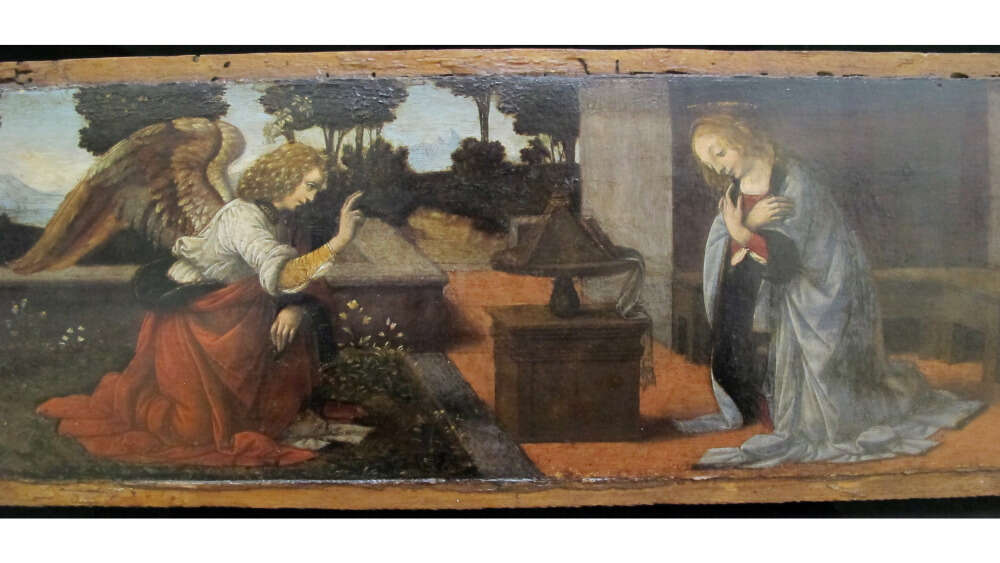When I find myself in times of trouble, Mother Mary comes to me
Speaking words of wisdom, let it be
And in my hour of darkness she is standing right in front of me
Speaking words of wisdom, let it be
– John Lennon, Paul McCartney, May 1970
I’ve been thinking about Mary, the mother of Jesus, a lot this week. About the “Annunciation” – that biblical story told in Luke 1.26–38, when the angel Gabriel comes to her and tells her she will become pregnant with Jesus. I should have been reflecting on all this eight and a half months ago, I guess, so I could track with the biblical story. Mary’s about to give birth in a couple of weeks and I’m just catching up with her getting the news of conception. Nonetheless, here I am.
I’m not Catholic, so I’m aware that I view Mary quite differently to the way Catholics and Orthodox Christians do, and I must confess that I’m not exactly sure how far these differences extend, so I really do hope nothing in this reflection offends. (And, if it does, please feel free to email me so I can apologise personally).
For me, Mary’s story is so … well, human. Luke takes just 30 verses to go from being unaware she has been chosen to carry Jesus, to being disturbed and confused by the logistics of it all (and fair enough, I reckon), to surrender and acceptance, and finally to pure joy and gratitude expressed by worshipping God.
From “How will this be, since I am a virgin?” to “Behold, I am the servant of the Lord; let it be to me according to your word” to “from now on all generations will call me blessed; for he who is mighty has done great things for me, and holy is his name.”
It’s a quite a journey – delivered with quintessential biblical brevity – and we can only imagine the untold story between Luke’s details. In fact, poets and artists of all types have done this work of “imagining” for thousands of years. From the works of Renaissance artists like Leonardo da Vinci (pictured above), to Beatles lyrics that open this article, to metaphysical poet John Donne’s magnificent work.
Just this week I came across stunning contemporary poet Laurie Sheck portrayal of Mary, which zeroes in on Mary’s initial fear at hearing Gabriel’s announcement.
… she wants to turn away, she cannot look
into the angel’s graven face. Because the child
meant to form in her will change her.
Because all she has known will dissolve,
pulling back from her like water.
Sheck’s Mary is not sure she’s up to the task that has been bestowed upon her.
For there is so little softness in me,
she thinks, and my hands are simply empty.
But as the young girl surrenders to what God’s will – and, yes, the loss that will come as part of it – Sheck masterfully conveys her spirit transformed.
… in the cave of her body
she might feel without willing it a tenderness
begin to form
This is a tenderness “like mourning” and “the source of love, she thinks, is mourning.”
Finally, the poem’s narrator tells us, this act of surrendering to this “loss” is actually how Mary – on behalf of us all and as a representative of us all – will see life “open”.
… the child that will soon form,
inside her body, this loss by which we come
to bend before the given, its arms that open
unexplained, and take us in.
If I’m honest, bending to the Lord’s will and accepting loss are not acts I am especially good at. I have my moments, but, at best, I’m a bit hit and miss. I suspect my response to an angelic announcement of this kind would have been more like that of Zechariah who, earlier in the chapter, after learning that his wife Elizabeth would soon conceive the baby who would be John the Baptist, was so demanding of the details that the angel forced him into months of silence by making him mute.
But regardless, I find Mary’s example of yielding has captivated me afresh this year. Perhaps it is because the year has been a tough one, or perhaps it is simply a product of growing older, but I find myself more eager to surrender to God’s will than I once did. To accept my losses, find the “arms that open unexplained” that Sheck describes, and simply say “let it be to me as you have said”.
Email This Story
Why not send this to a friend?



